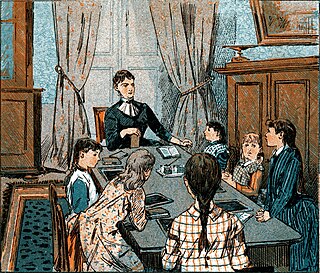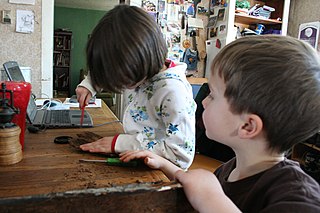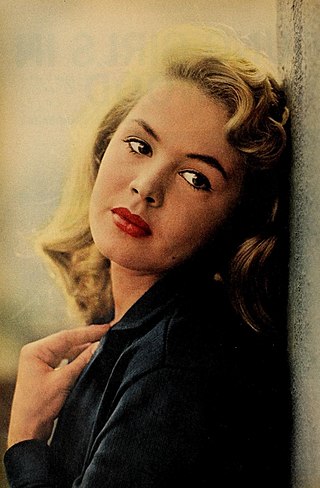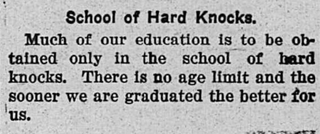The following outline is provided as an overview of and topical guide to education:

Homeschooling or home schooling, also known as home education or elective home education (EHE), is the education of school-aged children at home or a variety of places other than a school. Usually conducted by a parent, tutor, or online teacher, many homeschool families use less formal, more personalized and individualized methods of learning that are not always found in schools. The actual practice of homeschooling varies considerably. The spectrum ranges from highly structured forms based on traditional school lessons to more open, free forms such as unschooling, which is a lesson- and curriculum-free implementation of homeschooling. Some families who initially attended a school go through a deschool phase to break away from school habits and prepare for homeschooling. While "homeschooling" is the term commonly used in North America, "home education" is primarily used in Europe and many Commonwealth countries. Homeschooling should not be confused with distance education, which generally refers to the arrangement where the student is educated by and conforms to the requirements of an online school, rather than being educated independently and unrestrictedly by their parents or by themselves.

Unschooling is a belief of self-driven informal learning characterized by a lesson-free and curriculum-free implementation of homeschooling. Unschooling encourages exploration of activities initiated by the children themselves, under the belief that the more personal learning is, the more meaningful, well-understood, and therefore useful it is to the child.
Home education in the United Kingdom of Great Britain and Northern Ireland is often termed "elective home education" ("EHE") to signify the independent nature of practice from state provisions such as education for children with ill-health provided by the local authority in the family home. EHE is a collective term used in the UK to describe education provided other than through the schooling system. Parents have a duty to ensure their children are educated but the education legislation in England and Wales does not differentiate between school attendance or education otherwise than at school. Scots education legislation on the other hand differentiates between public (state) school provision and education "by other means", which includes both private schooling and home education. The numbers of families retaining direct responsibility for the education of their children has steadily increased since the late 1970s. This increase has coincided with the formation of support groups such as Education Otherwise. Home education may involve an informal style of education described as unschooling, informal learning, natural or autonomous learning. Others prefer to retain a structured school at home approach sometimes referred to as homeschooling although the terms are often interchanged.

John Caldwell Holt was an American author and educator, a proponent of homeschooling, and a pioneer in youth rights theory.

Iman Mohamed Abdulmajid, known mononymously as Iman, is a Somali-American model and actress. A muse of the designers Gianni Versace, Thierry Mugler, Calvin Klein, Donna Karan, and Yves Saint Laurent, she is also noted for her philanthropic work. She was married to rock musician David Bowie from 1992 until his death in 2016.
Grace Llewellyn is an American educator, author, and publisher. She is the founder of Lowry House Publishers, founder and director of Not Back To School Camp and The Hive: Self-Directed Learning for Teens.
Alternative education encompasses educational philosophy differing from mainstream pedagogy and evidence-based education. Such alternative learning environments may be found within state, charter, and independent schools as well as home-based learning environments. Many educational alternatives emphasize small class sizes, close relationships between students and teachers and a sense of community.

Sandra Dee was an American actress. Dee began her career as a child model, working first in commercials and then film in her teenage years. Best known for her portrayal of ingénues, Dee earned a Golden Globe Award as one of the year's most promising newcomers for her performance in Robert Wise's Until They Sail (1958). She became a teenage star for her performances in Imitation of Life and Gidget, which made her a household name.

John Taylor Gatto was an American author and school teacher. After teaching for nearly 30 years he authored several books on modern education, criticizing its ideology, history, and consequences. He is best known for his books Dumbing Us Down: the Hidden Curriculum of Compulsory Schooling, and The Underground History of American Education: A Schoolteacher’s Intimate Investigation Into the Problem of Modern Schooling which criticize the modern education system and promote the concept of unschooling and a return to homeschooling.
Minimally invasive education (MIE) is a form of learning in which children operate in unsupervised environments. The methodology arose from an experiment done by Sugata Mitra while at NIIT in 1999, often called The Hole in the Wall, which has since gone on to become a significant project with the formation of Hole in the Wall Education Limited (HiWEL), a cooperative effort between NIIT and the International Finance Corporation, employed in some 300 'learning stations', covering some 300,000 children in India and several African countries.
Deschooling is a term invented by Austrian philosopher Ivan Illich. Today, the word is mainly used by homeschoolers, especially unschoolers, to refer to the transition process that children and parents go through when they leave the school system in order to start homeschooling. The process is a crucial basis for homeschooling to work. It involves children gradually transitioning away from their schoolday routine and institutional mentality, redeveloping the ability to learn via self-determination, and discovering what they want to learn in their first homeschool days.
Wendy Priesnitz is a Canadian advocate of alternative education and environmentalism. She was leader of the Green Party of Canada from July 1996 to January 1997.

"Eve's Diary" is a comic short story by Mark Twain. It was first published in the 1905 Christmas issue of the magazine Harper's Bazaar, in book format as one contribution to a volume entitled "Their Husband's Wives" and then in June 1906 as a standalone book by Harper and Brothers publishing house.
The legality of homeschooling in India and a plethora of alternative education schools spread over different states has been debated by educators, lawmakers, and parents since the passing of the Right of Children to Free and Compulsory Education Act (RTE) which makes formal education a fundamental right of every child between the ages of 6 and 14 and specifies minimum norms for schools. While the legality of homeschooling still remains a grey area, there have been petitions by parents and alternate schools in the past for granting relief. As per the Universal Declaration of Human Rights to which India is a signatory, quote: "Parents have a prior right to choose the kind of education that shall be given to their children."

The School of Hard Knocks is an idiomatic phrase meaning the education one gets from life's usually negative experiences, often contrasted with formal education. The term originated in the United States; its earliest documented use was in 1870 in the book The Men Who Advertise:
"... his misfortunes were largely owing to the inexperience of youth. Trained, however, in the school of hard knocks, he now had learned the theory of success".
The legality of homeschooling varies in many countries. Countries with the most prevalent homeschooling movements include Australia, Canada, New Zealand, the United Kingdom, and the United States. Some countries have highly regulated homeschooling programs as an extension of the compulsory school system; others, such as Germany, have outlawed it entirely. In some other countries, while not restricted by law, homeschooling is not socially acceptable, or is considered undesirable, and is virtually non-existent.

Homeschooling in South Africa had been illegal, until it was recognized in 1996 under the South African School Legislation, since then it has grown significantly.

Jessica Pratt is an American musician and singer-songwriter based in Los Angeles, California. Her self-titled debut album was released in 2012 via Birth Records, a record label founded by White Fence songwriter Tim Presley to release Pratt's music. She is often associated with the freak folk movement. Her second and third albums are On Your Own Love Again (2015) and Quiet Signs (2019). She released her fourth album, Here in the Pitch, in 2024.
The Free School is the oldest independent, inner-city alternative school in the United States. Founded by Mary Leue in 1969 based on the English Summerhill School philosophy, the free school lets students learn at their own pace. It has no grades, tests, or firm schedule: students design their own daily plans for learning. The school is self-governed through a weekly, democratic all-school meeting run by students in Robert's Rules. Students and staff alike receive one equal vote apiece. Unlike Summerhill-style schools, the Free School is a day school that serves predominantly working-class children. Nearly 80 percent of the school is eligible for reduced-price meals in the public schools. About 60 students between the ages of three and fourteen attend, and are staffed by six full-time teachers and a number of volunteers.









